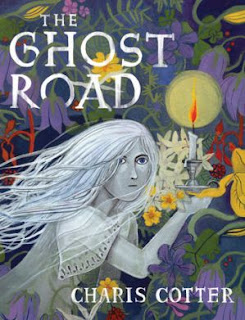Charis Cotter is the author of The Ghost Road, a new novel for kids. Her other books include The Swallow and The Painting. She lives in Newfoundland.
Q:
How did you come up with the idea for The Ghost Road?
A:
I live in a beautiful spot in Newfoundland, with ocean on one side and a series
of hills and meadows on the other. At a certain spot on the road that leads up
over the hill and into the meadows, you can see the very faint outline of where
there used to be a road, 60 years ago. When I first saw it, I started calling it the
Ghost Road, and I have wanted to write a story about it ever since.
I’ve
also visited some forgotten graveyards in Newfoundland, and they are so lovely
and timeless that they gave me story ideas too. And there was a tsunami in
Newfoundland in 1929, where whole houses were swept away, along with the people
in them, and that also took root in my imagination.
Early
in my thinking about the story, I imagined a ghost coming into the girl’s bedroom
carrying a candle, and the story just went on from there. My mother’s family is
from Ireland, and I have a strong sense of my female Irish ancestors and the
burdens of shame and guilt that get passed down in a family. All of this
influenced my story.
Q:
The novel focuses on many generations of twins. Why did you include that as one
of the book's themes?
A:
I’ve always been fascinated by twins. For centuries, twins have been held in
awe by the rest of us: they seem to have a magical quality and connection to
each other.
I
like the idea that a twin is never alone, that they have one person who
completely understands them. Like they’re two parts of one whole. The essential
loneliness of human beings seems somehow mitigated by being a twin, and that
idea appeals to me.
All
of my books so far have had two protagonists, not twins necessarily, but
friends who have a lot in common. I really like the idea of an ally: someone
who you can depend on and who is going through the adventure of life by your
side. All the poor twins in The Ghost Road have a dreadful time, but at least
they have each other.
There’s
also something about the repetition of twins in every generation that
underlines the power of the curse and the feeling that this family has to keep
going through the same struggles until they find a way to break the pattern.
Q:
The Ghost Road takes place in Newfoundland. How important is setting to you in
your writing?
A:
Setting is very important. The place a story happens really holds the power of
the story for me. I usually start with the setting and the story grows from
there.
I
find Newfoundland very inspiring, and in both The Painting and The Ghost Road, the
presence of the ocean and the lonely landscape function almost like another
character in the story.
The
Swallow was set in Toronto in two old houses that backed on to a cemetery in
one of the oldest parts of the city. This cemetery cast a pall over the houses
and their inhabitants, forming a backdrop for the ghostly activities that
plague the two main characters.
My
next book is set in a haunted Georgian house in a small town that could be
anywhere in North America. With that book, it’s the house itself that generates
the entire story.
Q:
Who are some of your favorite authors?
A:
My all-time favourites are Jane Austen, William Shakespeare, and J.R.R.
Tolkien. The classics. I can read them over and over again. I also love Gabriel
Garcia Marquez, Isabel Allende and Carlos Ruiz Zafon (the Spanish contingent!)
I
love murder mysteries, and my favourites in that genre are Laurie R. King,
Robert Galbraith (J.K. Rowling in disguise!) and Elizabeth George. For
children’s writers it’s Christopher Paul Curtis, L.M. Montgomery and E.B.
White.
Q:
What are you working on now?
A:
I’m working on a book about a girl named Alice who has a hard time
distinguishing between what’s her imagination and what’s real. Her parents are
in the process of splitting up, and she and her mother go to live in a haunted
house in the country where Alice has some very disturbing experiences.
As
with my other books, I’m exploring how characters can find their inner strength
while negotiating a world where nothing is ever quite what it seems. I’m having
fun with the ghosts!
Q:
Anything else we should know?
A:
I used to be an actor, and I think this helps me when I’m writing dialogue. I
believe that many of the creative arts feed into each other. One of the ways I
still get to perform in front of an audience is by visiting schools with my
books and telling Newfoundland ghost stories. I really enjoy working with kids
and it helps me keep in touch with my readers.
Thank
you for inviting me to your blog, Deborah. It’s been a pleasure!
--Interview with Deborah Kalb




Great interview Charis. Keep writing your beautifully haunting work!
ReplyDelete